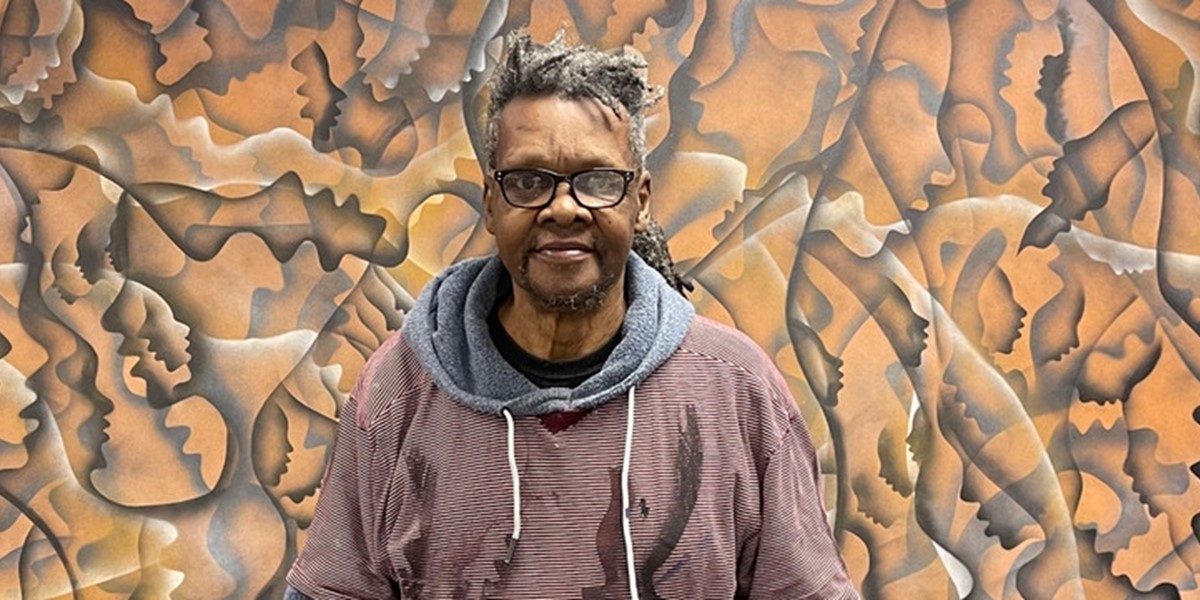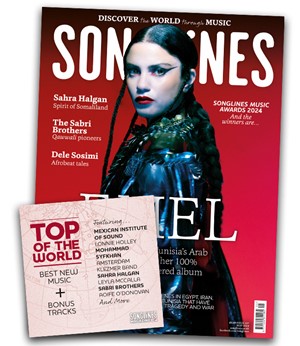Thursday, April 4, 2024
Lonnie Holley's My World: “I keep seeing what’s happening in the world and trying to make music about it”
Doug DeLoach speaks to the sculptor, painter and musician who prioritises improvisation, with lyrics summoned on the spot and no two shows the same

Lonnie Holley (photo: Matt Arnett)
I try to talk to the whole level of humanity. I try to sing for the whole level of humanity.” Those are the words of internationally renowned visionary artist, musician and educator Lonnie Holley.
Born in Birmingham, Alabama, in 1950, the seventh of 27 children, Holley spent a significant portion of his life trying to ‘sneak off the slave ship,’ to borrow a line from a song on his 2019 album, MITH. As a child, he was raised in foster homes where he was tormented by alcoholic caretakers. As a teenager, he was sent to a notorious state juvenile work farm (whose horrific legacy was told in the 2023 podcast Unreformed: the Story of the Alabama Industrial School for Negro Children) where he was brutalised and tortured before being rescued at age 14 by his grandmother. “I didn’t have no more than a seventh-grade education,” Holley says. “I didn’t know how to read and write that well.”
Eventually, Holley steered away from the dark fate which befell many of his peers during the Jim Crow era, by virtue of an extraordinary imagination, intelligence and unflagging spirit. A self-taught sculptor, he garnered attention by carving small burial headstones from the sandstone-like detritus cast off by iron and steel foundries. Later, he created assemblages from scrap wood and metal, discarded household and office items, found objects and sundry materials. Over time, his hilltop yard next to the Birmingham airport was transformed into an art compound, which drew tour buses, collectors and scavengers.
In the 80s and 90s, Holley was deemed a leading member of the ‘outsider art’ movement, which celebrated work by ‘non-traditional’ and ‘folk’ artists. Today, his sculptures, paintings, drawings, collages, photography and installations can be seen in major museums and galleries around the world. In spring 2023, his work was included in the London Royal Academy of Arts’ exhibition Souls Grown Deep Like the Rivers: Black Artists from the American South.
As a young man, Holley had always entertained himself by singing and noodling around on a cast-off Casio keyboard, performances which he recorded on cassette. His music career came years after his recognition as a visual artist. Holley’s concerts are entirely improvised. The lyrics are rendered in the moment, based on daily experience and observation. The music is created onstage by Holley and a combination of accompanists who are either in the vicinity or recruited for the purpose. His singing draws on a collage of R&B, rap, scat and blues. From one bar, verse or song to the next, playful whistling and child-like jabberwocky can give way to Zulu growls and rock anthem revelry.
“The earliest music I remember hearing came from the Rock-Ola jukebox at the McElroy’s [foster home] where people would come over for a shot of Joe Louis whiskey, which made them dance all night,” Holley tells me. When asked his favourite songs, Holley replies, “I don’t know if I have a favourite song list, but I love Stevie Wonder, Bob Dylan, Erykah Badu, Ray Charles, James Brown, Jackie Wilson, Aretha Franklin.” Upon further pressing he says, “Jackie Wilson’s ‘Lonely Teardrops’ taught me how to listen to the slower songs and get something different out of them. That’s when I started listening to the words and not just the beat.”
At one point, Holley lived in a house adjacent to a drive-in movie theatre where he earned pocket money picking up trash while also pocketing loose change found in popcorn boxes and on the ground where cars parked. He rigged an unofficially appropriated metal car speaker to carry sound from the theatre. “I used to sit on top of the house and watch and listen to every movie,” Holley says. “I didn’t really think at the time that I was listening to music, but now that I’ve made music for films… I see how much those memories have served me.”
Since 2012, Holley has released five critically-acclaimed albums. The latest, Oh Me Oh My (2023), produced by Garret ‘Jacknife’ Lee, features collaborations with Bon Iver, Michael Stipe, Moor Mother, Sharon Van Etten and Rokia Koné, while a periodic touring schedule has seen him perform across the US, Europe, Brazil, Australia and New Zealand, sharing stages with Animal Collective, Deerhunter, Bill Callahan, Saul Williams, Tinariwen and Daniel Lanois.
Because Oh Me Oh My was recorded during the pandemic, the process involved sending music files back and forth with a minimum of direct interaction. “Despite the limitations, it was a great experience,” Holley explains. “Jacknife and I were in the studio, but the only person who came into the studio was Moor Mother. We had been talking about doing something together, but could never find the time… We’ve since played together in Germany and we are leaving this week to tour Australia together with her band.”
On tour, Holley is exposed to music from myriad cultures and sometimes recruits local musicians as accompanists. In New Zealand, he was joined onstage by Māori musicians. In Brazil, his friend and engineer Rafael Pereira took him to local performances. In Prague, he encountered street musicians playing trad Czech songs who let him sing and dance along. Back in the US, cellist-composer Ben Sollee stopped by Holley’s art studio while on tour with his bluegrass band, Kentucky Native. When a jam broke out, Holley chimed in. “I didn’t grow up with that kind of music, but it sounded so beautiful.”
During the 2019 FORM Festival in Arizona, Holley performed with Robert Glasper and Vieux Farka Touré. In Los Angeles, Tinariwen invited him onstage to sing. “That was a beautiful night,” Holley says. “It’s so interesting when people from very different parts of the world can come together and play in the common language of music.”
Before his first album as a professional, Holley explains that he “was just channelling what was in my head, trying to keep myself comforted by singing the truth to my mama and my grandmama and my kids since they were about the only people hearing me. Sometimes the neighbours might have heard me, too, but they never called the police.”
In the process of making albums and performing hundreds of concerts, Holley has developed a unique, distinctive sound and methodology. “My sound came naturally to me,” he says. “But, playing and singing over the years has made me a better singer… I’m a long way from perfect, but I’m on the other side of the pulpit. I keep seeing what’s happening in the world and trying to make music about it. My music may not be like other people’s, but I’m totally fine with that. Just like my art, I wasn’t doing it for other people, but it ended up in museums. I’m okay with that. I love sharing my art and music with people.”
Lonnie Holley will play the Roundhouse, London (as part of In The Round Festival) on 26 April 2024. Tickets and more info here.
Lonnie Holley’s ‘I am a Part of the Wonder (feat Moor Mother)’ is on this issue’s compilation.
This article originally appeared in the May 2024 issue of Songlines. Never miss an issue – subscribe to Songlines today

